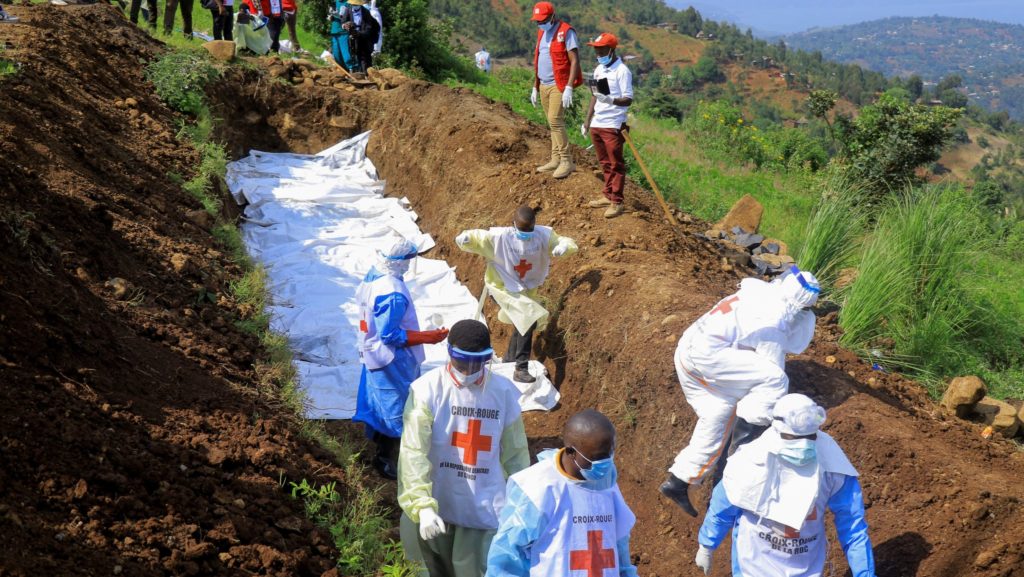A "silent genocide" -- mimicking the Rwandan one of 1994 -- is occurring eastern Congo, said some Catholic Church sources, as shock greeted the killing of 70 people in a Protestant church in the North Kivu Province.
The victims were found beheaded with machetes Feb. 15 near the Maiba village in Lubero, a district close to the border between Rwanda and Uganda, according to Fides, a news agency of the Dicastery of Evangelization. Many of those who died in the massacre were women, children and the elderly and had their hands tied behind their back.
The Orthodox Public Affairs Committee, an Orthodox agency that champions for Christian communities facing persecution, said the victims were taken from their homes days earlier.
"This heinous act, perpetrated within a sacred place of worship, is an egregious violation of human rights and a direct assault on religious freedom," said the organization in a statement on Feb. 23.
Allied Democratic Forces, an Islamist group originally from Uganda and aligned to the Islamic State group is believed to have carried out the killings.
According to the Orthodox committee, actions by the Islamist group have instilled fear and chaos in the region, forcing countless Christians to flee their homes.
"The local community is devastated, with churches, schools, and health centers shutting down due to the deteriorating security situation," the statement said.
More than 100 rebel groups operate in the mineral-rich eastern Congo, with the ADF and the Rwanda-backed M23, or Movement 23, being some of the most deadly. The ADF is known for attacking churches, beheading Christians and kidnapping people for use as slaves or fighters.
But as the condemnation of the killings continued, Catholic Church sources said the latest massacre further underlined a genocide that has unfolded in the country for years.
"It is silent genocide that has not been told. It reminds of what happened in Rwanda in 1994," a Catholic priest who requested anonymity for security reasons told OSV News. "It has been occurring for the last 30 years, but the international community has been silent."
Since 1996, the conflict in eastern Congo has killed an estimated 6 million people.
In the first Congo war, Rwanda invaded Zaire (now Congo) in pursuit of Hutu ethnic extremists who had fled there after they committed a genocide in neighbouring Rwanda. The 1994 Rwanda genocide left nearly one million members of Tutsi and moderate Hutu people dead. In the second Congo war, two years later, Rwandan and Ugandan armies fought deadly battles in Bunia and Kisangani regions, resulting in heavy civilian casualties.
Father Dennis Dashong Pam, a Missionary of Africa priest who served in eastern Congo for more than 10 years said although the killings in Congo did not fit in the actual definition, the huge number of the deaths was equivalent to a genocide.
"Villages of the Congolese have systematically been wiped out. Yes! We can say a genocide is occurring," said Father Dashong Pam. The cleric feared a repeat of the violence in the mid-1990s, when national armies fought in the region, leading to the fall of the then-dictator, Mobutu Sese Seko's government.
"The people of Congo would not want to see a repeat of that. Too many people died," the priest said.
According to the 1948 Convention on the Prevention and Punishment of the Crime of Genocide, called the Genocide Convention, genocide means acts committed with intent to destroy, in whole or in part, a national, ethnical, racial or religious group, by killing members of the group, causing serious bodily or mental harm to its members, imposing measures intended to prevent births within the group or forcibly transferring children of the group to another group.
The M23 rebels have recently surged in eastern Congo, seizing more territory and towns and leaving behind a trail of death, pain and destruction. On Jan. 27, the rebels captured Goma, the capital of North Kivu. At least 3,000 people died in the battle for the city, the humanitarian capital of the region.
The rebels captured Bukavu, the capital of South Kivu, on Feb. 16. Unlike Goma, the movement met little resistance from the government forces.
Father Dashong Pam said all the fighting and violence is fueled by competition for mineral resources including tin, gold, coltan and cobalt. The last two are minerals which find wide use in electronics. Cobalt is used to make the batteries used in mobile phones and cars, and coltan is refined into tantalum, also used in the production of electronic components.
"It is all about the minerals. This story has to be told. It is a weapon: You terrorize the people and they run away from an area with plenty of minerals. When they are gone, you start exploiting the minerals," said the priest.
During his visit to Congo and in South Sudan Jan. 31-Feb. 5, Pope Francis referred to the Congo violence as an overlooked genocide perpetrated by generations of exploiters, plunderers and power-hungry groups.
"Hands off the Democratic Republic of the Congo! Hands off Africa," Pope Francis insisted Jan. 31, 2023, remarks met with applause and the stomping of feet. "Stop choking Africa: It is not a mine to be stripped or a terrain to be plundered."
The people of Congo are more precious than any of the gems or minerals found in the earth beneath their feet, yet they have been slaughtered by warmongers and exploited by prospectors, Pope Francis said.
"This country, so immense and full of life, this diaphragm of Africa, struck by violence like a blow to the stomach, has seemed for some time to be gasping for breath," the pope said at a meeting with Congo's President Felix Tshisekedi, other government and political leaders, diplomats and representatives of civil society.

